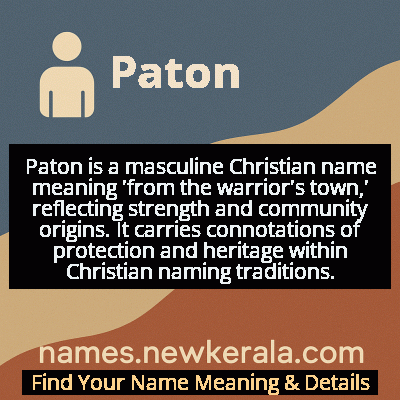Paton Name Meaning & Details
Origin, Popularity, Numerology Analysis & Name Meaning of Paton
Discover the origin, meaning, and cultural significance of the name PATON. Delve into its historical roots and explore the lasting impact it has had on communities and traditions.
Name
Paton
Gender
Male
Origin
Christian
Lucky Number
3
Meaning of the Name - Paton
Paton is a masculine Christian name meaning 'from the warrior's town,' reflecting strength and community origins. It carries connotations of protection and heritage within Christian naming traditions.
Paton - Complete Numerology Analysis
Your Numerology Number
Based on Pythagorean Numerology System
Ruling Planet
Jupiter
Positive Nature
Optimistic, inspirational, and creative.
Negative Traits
Scattered, exaggerating.
Lucky Colours
Yellow, gold, purple.
Lucky Days
Thursday.
Lucky Stones
Yellow sapphire.
Harmony Numbers
1, 2, 9.
Best Suited Professions
Arts, writing, communication.
What People Like About You
Creativity, optimism.
Famous People Named Paton
Alan Paton
Author and Anti-Apartheid Activist
Wrote 'Cry, the Beloved Country' and was a prominent anti-apartheid activist in South Africa
Michael Paton
Scottish Footballer
Professional footballer who played for clubs including St Mirren and served as a coach
John Paton
Scottish-American Journalist
Prominent newspaper editor and publisher who founded the New York Evening Journal
Andrew Paton
Canadian Businessman
Founder of Paton Manufacturing Company, later known as Dominion Textile
Name Variations & International Equivalents
Click on blue names to explore their detailed meanings. Gray names with will be available soon.
Cultural & Historical Significance
In Christian contexts, the name Paton has been embraced by families who appreciate its combination of martial symbolism with community values. The warrior association aligns with Christian concepts of spiritual warfare and defending one's faith, while the town element emphasizes Christian community and fellowship. Many prominent Patons in history have been noted for their religious convictions and community service, further strengthening the name's Christian associations. The name continues to be used in Christian communities today, particularly among Presbyterian and other Protestant denominations with Scottish heritage, serving as a bridge between cultural identity and religious faith.
Extended Personality Analysis
People named Paton are typically characterized by their strong sense of duty and unwavering loyalty. The name's warrior origins suggest someone who approaches life's challenges with courage and determination, while the community aspect indicates a person who values relationships and collective well-being. Patons are often natural protectors who take their responsibilities seriously, whether in family, work, or community contexts. They tend to be practical problem-solvers who combine traditional wisdom with innovative thinking, making them effective in leadership positions where both stability and adaptability are required.
Emotionally, Patons are often reserved but deeply feeling individuals. They may not readily express their emotions but demonstrate their care through consistent actions and steadfast support. Their strength lies in their reliability and the quiet confidence they inspire in others. While they can be traditional in their values, they're typically open-minded and willing to consider new perspectives when presented with compelling evidence. The combination of warrior spirit and community focus creates individuals who are both strong in conviction and compassionate in action, making them valued members of any group or organization they join.
Modern Usage & Popularity
In contemporary naming practices, Paton maintains a steady though modest presence, primarily among families with Scottish heritage or those seeking distinctive traditional names. While it doesn't rank in the top names lists in most English-speaking countries, it enjoys consistent usage as both a first name and middle name. The name has seen a slight increase in popularity in recent decades as part of the broader trend toward surname-style first names and the revival of Celtic and Scottish names. It's particularly favored in Scotland, where it ranks within the top 500 names for boys, and in countries with significant Scottish diaspora communities like Canada, Australia, and the United States. Modern parents often choose Paton for its strong, masculine sound, cultural significance, and relative uniqueness compared to more common Scottish names like Liam or Logan.
Symbolic & Spiritual Meanings
Symbolically, Paton represents the harmonious balance between individual strength and community responsibility. The warrior element symbolizes courage, protection, and the willingness to stand up for one's beliefs, while the town component represents community, heritage, and the importance of collective identity. This combination creates a powerful metaphor for leadership that serves rather than dominates, strength that protects rather than intimidates, and individuality that enriches rather than separates from community. The name also carries symbolic weight as a bridge between past and present, honoring ancestral traditions while remaining relevant in modern contexts. For Christian families, it can symbolize the Christian soldier archetype—someone who fights spiritual battles while building up the community of faith through service and leadership.

